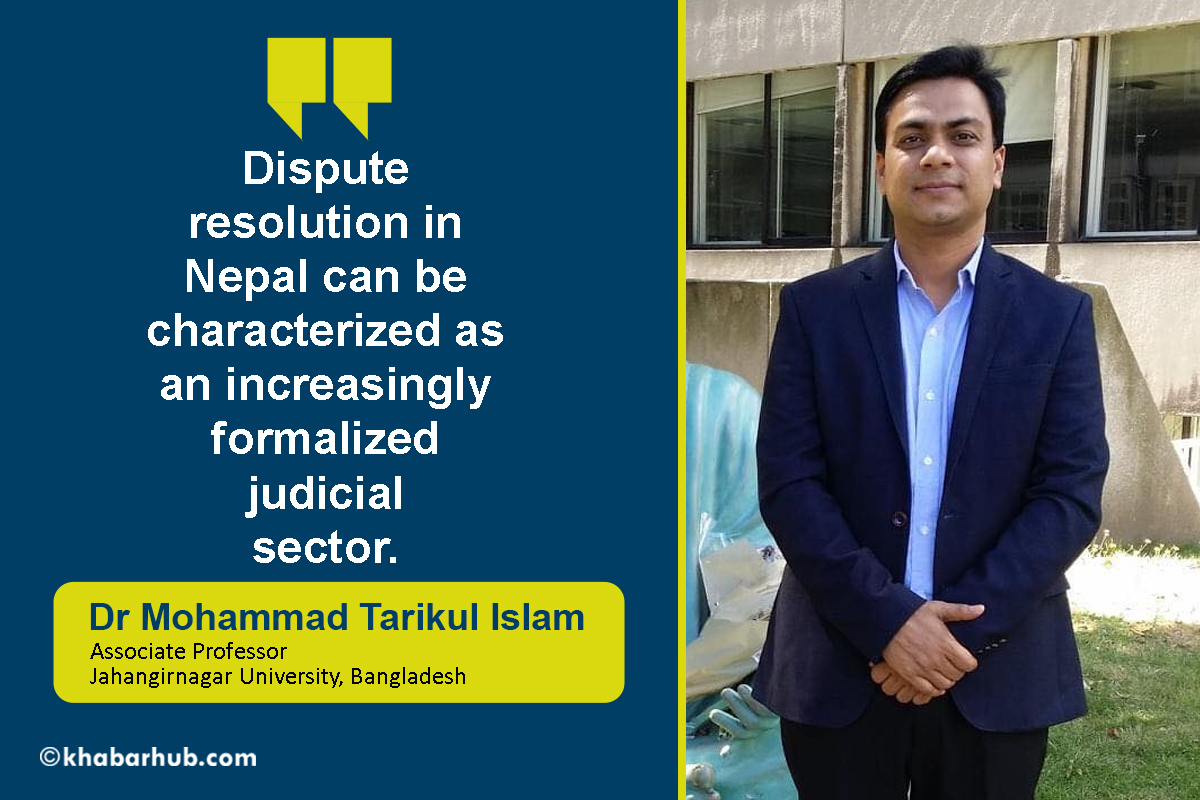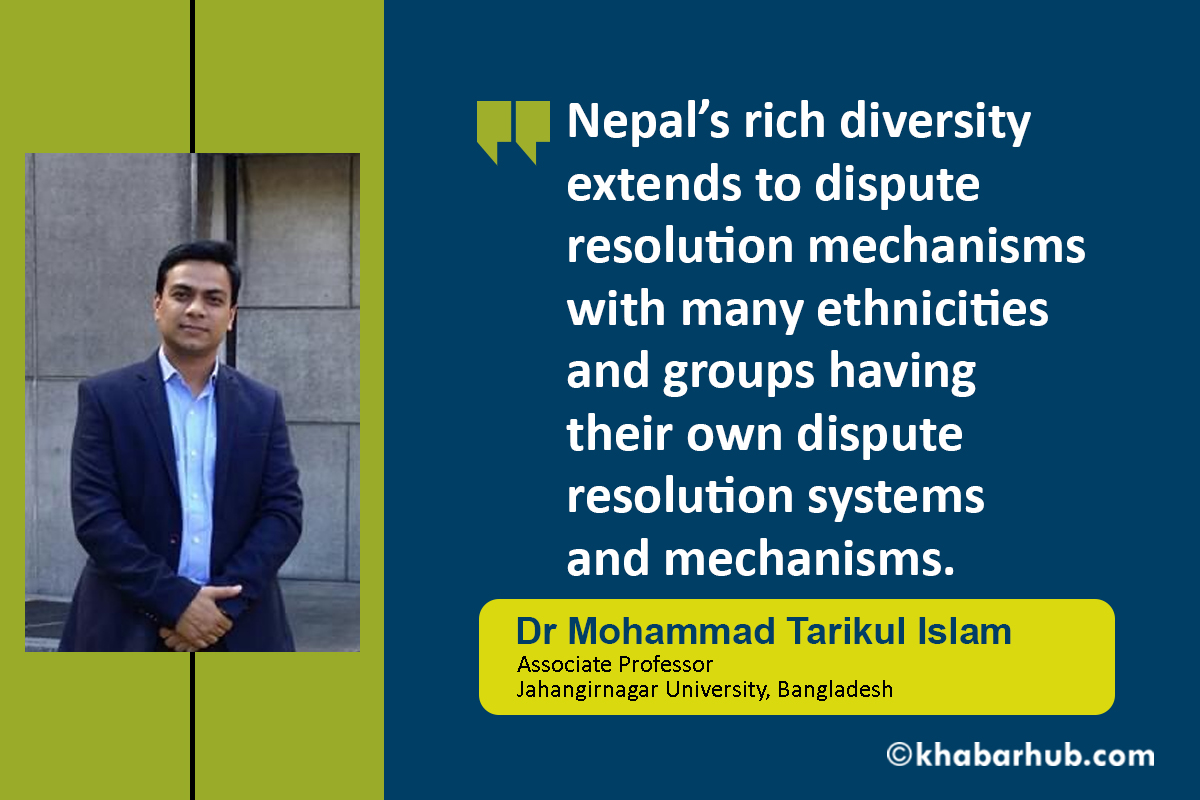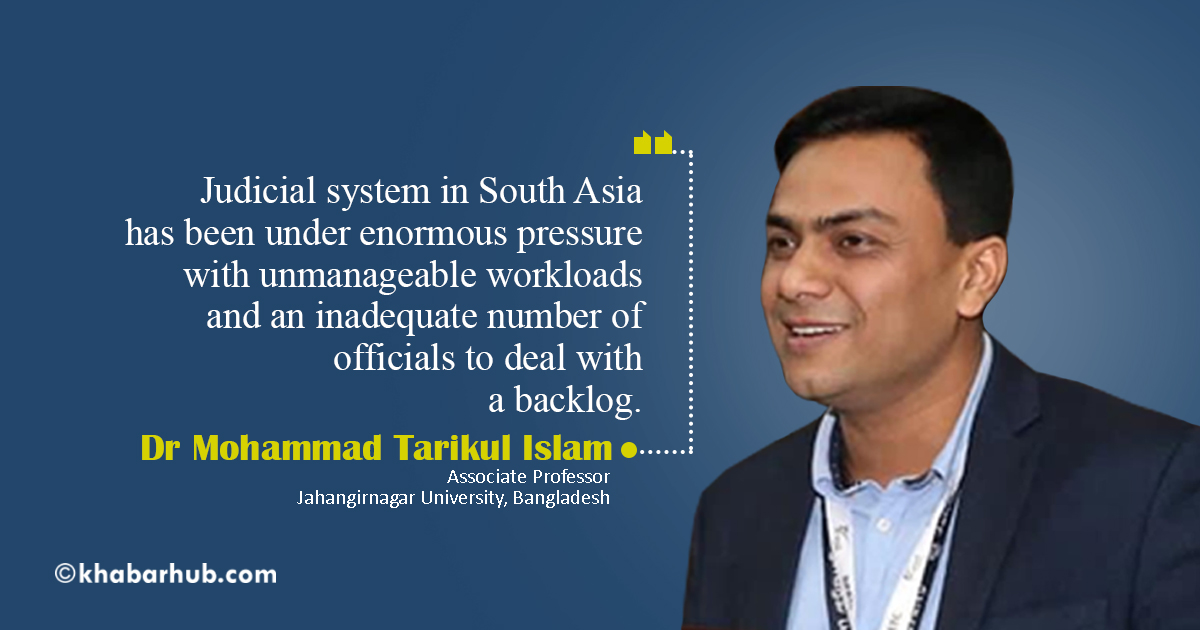Dr. Mohammad Tarikul Islam is an Associate Professor of Government and Politics at Jahangirnagar University in Bangladesh. Before joining University in 2014, he was serving the United Nations Development Program for seven years in the areas of Local Government and Disaster Management.
As a Visiting Research Fellow at Oxford in 2018, Dr. Islam had accomplished research on the Role of Local Government in Dispute Resolution with a particular focus on South Asia.
Khabarhub had a conversation with Dr Islam on justice for marginalized people in the region. Excerpts of the interview:
Why should the informal judicial system be made effective in developing countries?
In highly individualized urban society we tend to think of dispute resolution in terms of the formal justice system, but that for most of history and even today for many people without access to that system dispute resolution is based on various informal mechanisms that may or may not be integrated with the formal system.
Informal dispute resolution tends to be more accessible and effective, but it often operates in summary or even arbitrary ways.
The formal judicial system places more emphasis on procedural justice, but its accessibility and effectiveness are often in doubt.
Rural poor are socially excluded and suffer from discrimination, deterring them from accessing even informal village courts.
If we look at the South Asian countries, for a long time, the judicial system has been under enormous pressure, with unmanageable workloads and an inadequate number of officials and staff to deal with a backlog that amounted to millions of cases.
What is more, the rural poor and other vulnerable people are unable to afford the cost of litigation and don’t have a sufficient understanding of how to gain access to justice in formal courts on issues that, in any case, are better resolved at the local level.
Only a few people in developing countries can afford to take legal action. In addition to that, the formal judicial system has other problems. It suffers from ever-growing caseloads, leading to a situation where individual cases can drag on for years if not decades. Unsurprisingly, therefore, practices of informal dispute settlement continue.
How does Village Court in Bangladesh perform to deliver fair play in dispute resolution?
Bangladesh has inherited from colonialism an adversarial judicial system which is highly formalized and places great emphasis on due process.
Unfortunately, the system is incapable of meeting the needs of society, especially in the countryside: Fees are unaffordable, delays enormous, procedures impenetrable, corruption rampant, and judges biased against poor and other marginalized people.

To bridge the gap between informal and formal dispute resolution, Bangladesh has redesigned Shalish through the 2006 Village Courts Act.
The 2006 act provides for the establishment of a Village Court in every Union Parishad (UP), the lowest tier of local government.
In this way, Bangladesh offers an interesting case where informal dispute resolution has been institutionalized as an alternative route to justice. Ideally, village courts combine the best of Shalish on the one hand “accessibility and effectiveness” and of the formal judicial system on the other “procedural justice”.
Despite the reform, it remains debatable to what extent village courts actually work for those who need them most.
Rural poor are socially excluded and suffer from discrimination, deterring them from accessing even informal village courts.
Even when they dare to do so, they may not get a fair hearing as procedural justice is undermined by local power imbalances and widespread practices of nepotism and corruption.
What is more, the effectiveness of the system is jeopardized by a lack of capacity and enforcement problems. While the powers of village courts are significant, their capacities are limited in practice.
In theory, every six months the UP chairman has to submit a report to the sub-district (Upazila), but this does not happen in most cases.
Besides, UP is overburdened with other activities and does not have the manpower to keep a tally of judicial decisions and write a formal report about the activities of their village courts every six months.
How about the performance of Panchayat to ensure access of rural people to justice in India?
In India, most of the cases are found to be settled by way of litigation under the auspicious of Panchayat.
The quest for justice has been ideal, which the citizens have been aspiring for generations down the line. The constitution reflects this aspiration in the preamble itself, which speaks about justice in all its forms: social, economic and political. Justice is a constitutional mandate and the constitution has tossed up many issues relating to the working of the judiciary; the most important being court congestion and judicial delays.
Article 40 of the constitution of India directs the State to take steps to organize village panchayats and confer them with such powers and authority as may be necessary to enable them to function as units of self-government.
Only cohesive and convincingly operational reasoning for the execution of a panchayat system of justice is to increase access to justice for all the citizens regardless of caste, religion, sex, color, education and so on.
From the perspective of the poor people, this is a short cut to settling their disputes since they lack the time and resources to engage in legal means of prolonged dispute settlement.
With a rapid increase in the number of people approaching the courts, the primary concern faced by the Indian judiciary is the escalation in the number of new cases coming in and an ever-increasing backlog.
Delay in the formal justice administration is the biggest operational obstacle and therefore, poor and marginal people in rural India get confidence to approach Panchayat rather than formal court.
Members of dispute resolution panels are honored with a symbolic honorarium for distinguishing their efforts. Domestic Violence is also met in the Indian panchayat.
To what extent, Nepal’s informal judiciary is functioning?
Nepal has a long history of traditional dispute resolution. There are 102 different castes and ethnicities, and 92 different spoken languages.
Both formal and informal conflict resolution methods are found to be applied by municipality to resolve community-level problems.
This rich diversity also extends to dispute resolution mechanisms with many ethnicities and groups having their own dispute resolution systems and mechanisms.
The push towards formal litigation during the Rana regime weakened traditional dispute resolution systems, but they did not collapse.
At present, dispute resolution in Nepal can be characterized as an increasingly formalized judicial sector, coupled with a patchwork of village-level dispute resolution mechanisms.
The government is working to bring uniformity to mediation through the implementation of the Mediation Act. Community mediation exists in only a small number of villages.
Elsewhere, disputants continue to turn to traditional institutions, to the Village Municipality Secretary.

It is is entrusted with responsibilities for managing local level conflict and its provisions for the salary of them who are engaged in dispute resolution.
A panel of three mediators facilitates the mediation process. Each disputing party gets to choose a mediator. The third mediator is chosen by the municipality or the district coordinator to ensure that the mediation panel is diverse in terms of gender and ethnicity.
Both formal and informal conflict resolution methods are found to be applied by municipality to resolve community-level problems.
These municipalities excel in ensuring community harmony by resolving disputes of a nature that would never make it to the formal court, such as minor physical assault, verbal abuse, misunderstanding between spouses, cases where an individual is ostracized by the community and local development disputes.
By becoming an avenue to resolve these kinds of disputes which would never go to courts, municipality’s community mediation program has contributed to community harmony.
How does Pakistan’s local government work in providing rural people access to justice?
In Pakistan, legal pluralism has taken the form of the tribal justice system and prominent denomination of this justice system is panchayat across the country. Women and children are treated as a tool of conciliation and compensation and the equal rights of both genders are not given proper attention in the panchayat justice system.
This sort of biased attitude in the panchayat justice truly undermines the credibility of this entity for the causes of fair play and social justice. There are serious problems with the way the traditional justice system is practiced in Pakistan.
A streamlining of the process for enforcing decisions, a system for proactive judicial supervision of the courts ‘compliance with fundamental rights and with rural judiciary procedure and the provision of administrative assistance’ for the running of the courts needs to be well-thought-out.
It is prone to both elite capture and gender bias, and often serves sectional interests of those who hold authority in traditional jirgas or panchayats domain.
However, many of the shortcomings of the Alternative Dispute Resolution (ADR) can be overcome by integrating it into the formal legal system. While the Alternate Dispute Resolution Act was adopted by parliament in 2016, no effort has been done to implement it in the federal.
Moreover, economies with an integrated system of courts and ADR tend to have a more reliable judiciary, benefiting the courts, the parties involved, and the economy as a whole.
How to make the rural judiciary more effective in South Asia?
Initiatives like opening up more opportunities for legal employment in rural judiciary under the auspicious of the local government and designing more legal entry channels for individuals would allow them endowed with different forms of capital to capitalize on their own resources and enhance their capabilities to lead a good life.
Policies designed to promote an individual’s capabilities would enable rural judicial officials to follow the aspirations of the poor and marginal segments in the rural society and listen to their agony for fair arbitration.
Rural justice is severely influenced by the local electoral politics particularly local government representatives to exert their power and to continue their leadership.
Rural poor women and vulnerable groups are the main target audience of the rural courts while the women are less exposed and voiced with their demand. The availability of rural judiciary services will undoubtedly allow their access to local justice services. The women-friendly environment in the court premises is thus very important.
Local government representatives, rural courts official including panel members need adequate sensitization with gender-friendly behavior, provision should be made for nominating at least one woman in the panel in cases of women’s interest is associated.
Provision for the incorporation of at least one woman member in the constitution of a rural informal judicial system has been proposed where the interest of women or children is involved with any party to a case.
For the fairness of the rural judiciary, policymakers can deem limiting the authority of the local government chairperson, the inclusion of refusal rules, requirements of the public announcement of the sessions, and the right of parties to exclude a panelist.
A streamlining of the process for enforcing decisions, a system for proactive judicial supervision of the courts ‘compliance with fundamental rights and with rural judiciary procedure and the provision of administrative assistance’ for the running of the courts needs to be well-thought-out.
Civil society efforts in legal aid and alternative dispute resolution will remain crucial. Legal aid NGOs may also consider increasing their efforts to ensure state accountability at the local level.
Moreover, the rural judiciary should be strengthened so that nobody can use the power to force the verdict in their favor.
NGOs can employ legal action as well as broader advocacy to respond to corruption, abuse of authority, or failures in service delivery by the rural local government in South Asia.
Today, people living in rural South Asian countries are found to be divided according to political beliefs. Polarization between the ruling party and the opposition is very strong even in local government institutions.
Whatever one party does the other oppose. Rural justice is severely influenced by the local electoral politics particularly local government representatives to exert their power and to continue their leadership.
Transformation of the local justice system is central to the enhancement of equity and inclusion, within the context of broader local governance reform in Bangladesh, India, Nepal, and Pakistan.
Moreover, the rural judiciary should be strengthened so that nobody can use the power to force the verdict in their favor.
Relevant stakeholders like government, civil society, NGO, United Nations and donor agencies should work shoulder to shoulder to activate the village court in every union to ensure fair play in local dispute resolution and contribute towards protecting the human security of rural communities in Bangladesh and other South Asian countries.
Last but not least, local government should be empowered in a true sense so that it can play a tremendous role in resolving local disputes amicably and thus promoting social safeguards to avoid further local conflicts spiraling out of control.








Comment